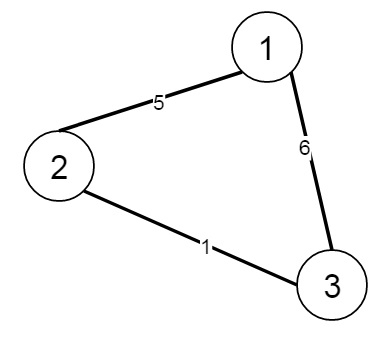
 Data Structure
Data Structure Networking
Networking RDBMS
RDBMS Operating System
Operating System Java
Java MS Excel
MS Excel iOS
iOS HTML
HTML CSS
CSS Android
Android Python
Python C Programming
C Programming C++
C++ C#
C# MongoDB
MongoDB MySQL
MySQL Javascript
Javascript PHP
PHP
- Selected Reading
- UPSC IAS Exams Notes
- Developer's Best Practices
- Questions and Answers
- Effective Resume Writing
- HR Interview Questions
- Computer Glossary
- Who is Who
Connecting Cities With Minimum Cost in Python\\n
Suppose there are N cities numbered from 1 to N. We have connections, where each connection [i] is [city1, city2, cost] this represents the cost to connect city1 and city2 together. We have to find the minimum cost so that for every pair of cities, there exists a path of connections (possibly of length 1) that connects those two cities together. The cost is the sum of the connection costs used. If the task is impossible, return -1.
So if the graph is like −

Then the output will be 6, Choosing any two cities will connect all cities, so we choose the minimum 2, [1, 5]
To solve this, we will follow these steps −
Define method called find(), this will take x
if parent[x] is -1, then return x
parent[x] := find(parent[x])
return parent[x]
Make another method called union(), this will take x and y
parent_x := find(x), parent_y := find(y)
if parent_x = parent_y, then return, otherwise parent[parent_y] := parent_x
From the main method, it will take n and conn
parent := an array of size n and fill this with – 1, set disjoint := n – 1, cost := 0
c := sorted list of conn, sort this based on the cost
i := 0
-
while i < length of c and disjoint is not 0
x := c[i, 0] and y := c[i, 1]
if find(x) is not same as find(y), then decrease disjoint by 1, increase the cost by c[i, 2], and perform union(x, y)
increase i by 1
return cost when disjoint is 0, otherwise return -1
Example(Python)
Let us see the following implementation to get a better understanding −
class Solution(object): def find(self, x): if self.parent[x] == -1: return x self.parent[x] = self.find(self.parent[x]) return self.parent[x] def union(self,x,y): parent_x = self.find(x) parent_y = self.find(y) if parent_x == parent_y: return self.parent[parent_y] = parent_x def minimumCost(self, n, connections): self.parent = [ -1 for i in range(n+1)] disjoint = n-1 cost = 0 c = sorted(connections,key=lambda v:v[2]) i = 0 while i<len(c) and disjoint: x = c[i][0] y = c[i][1] if self.find(x)!=self.find(y): disjoint-=1 cost+=c[i][2] self.union(x,y) i+=1 return cost if not disjoint else -1 ob = Solution() print(ob.minimumCost(3, [[1,2,5], [1,3,6], [2,3,1]]))
Input
3 [[1,2,5],[1,3,6],[2,3,1]]
Output
-1

